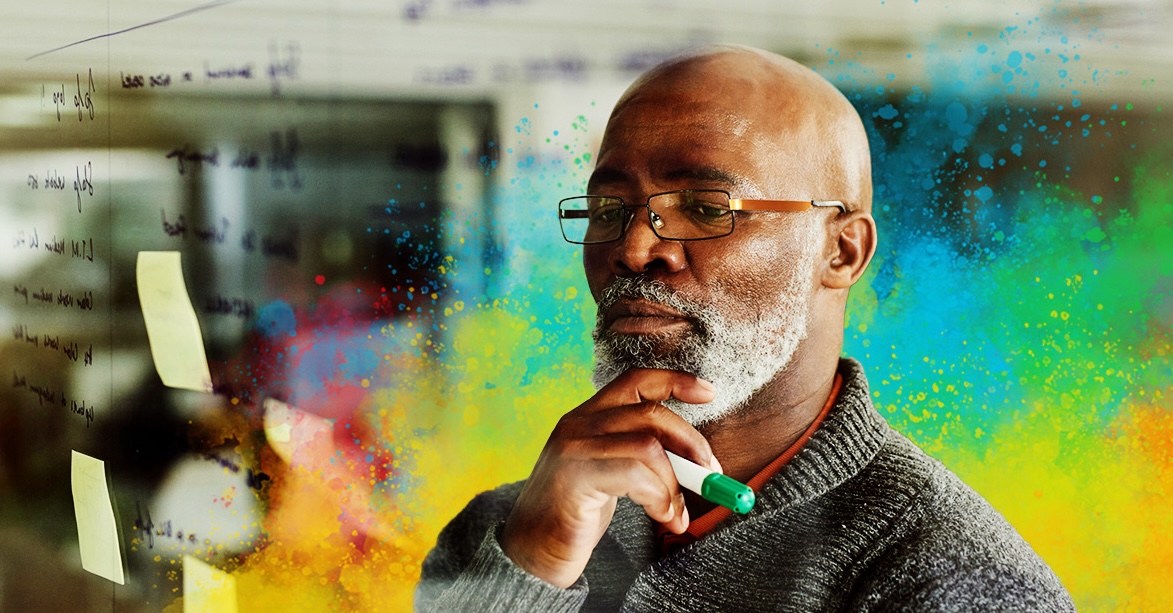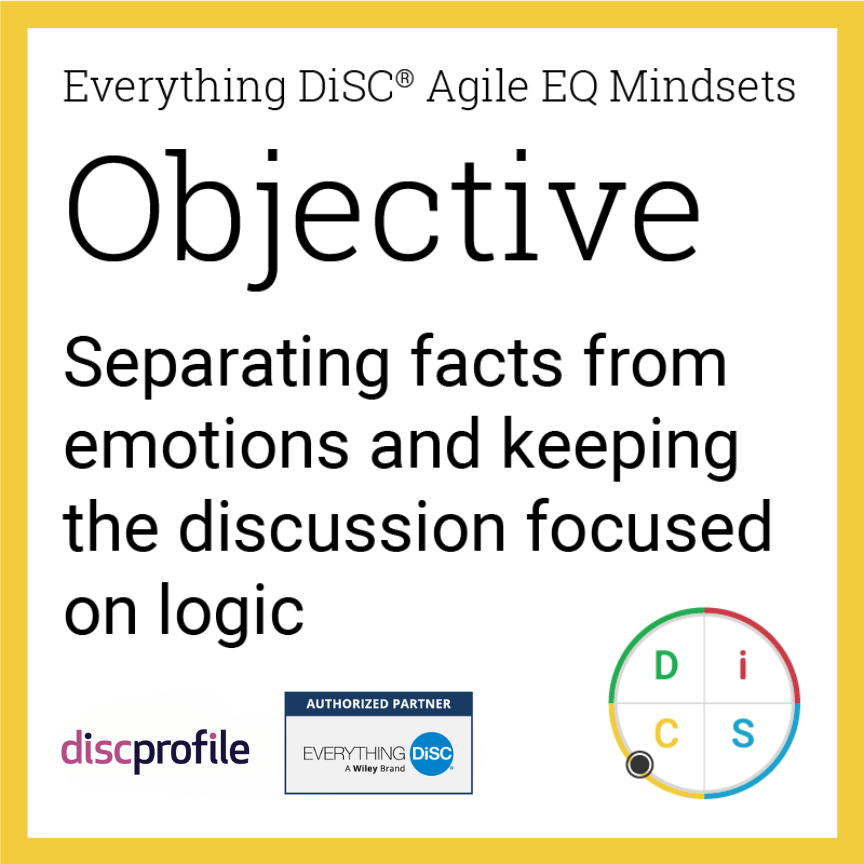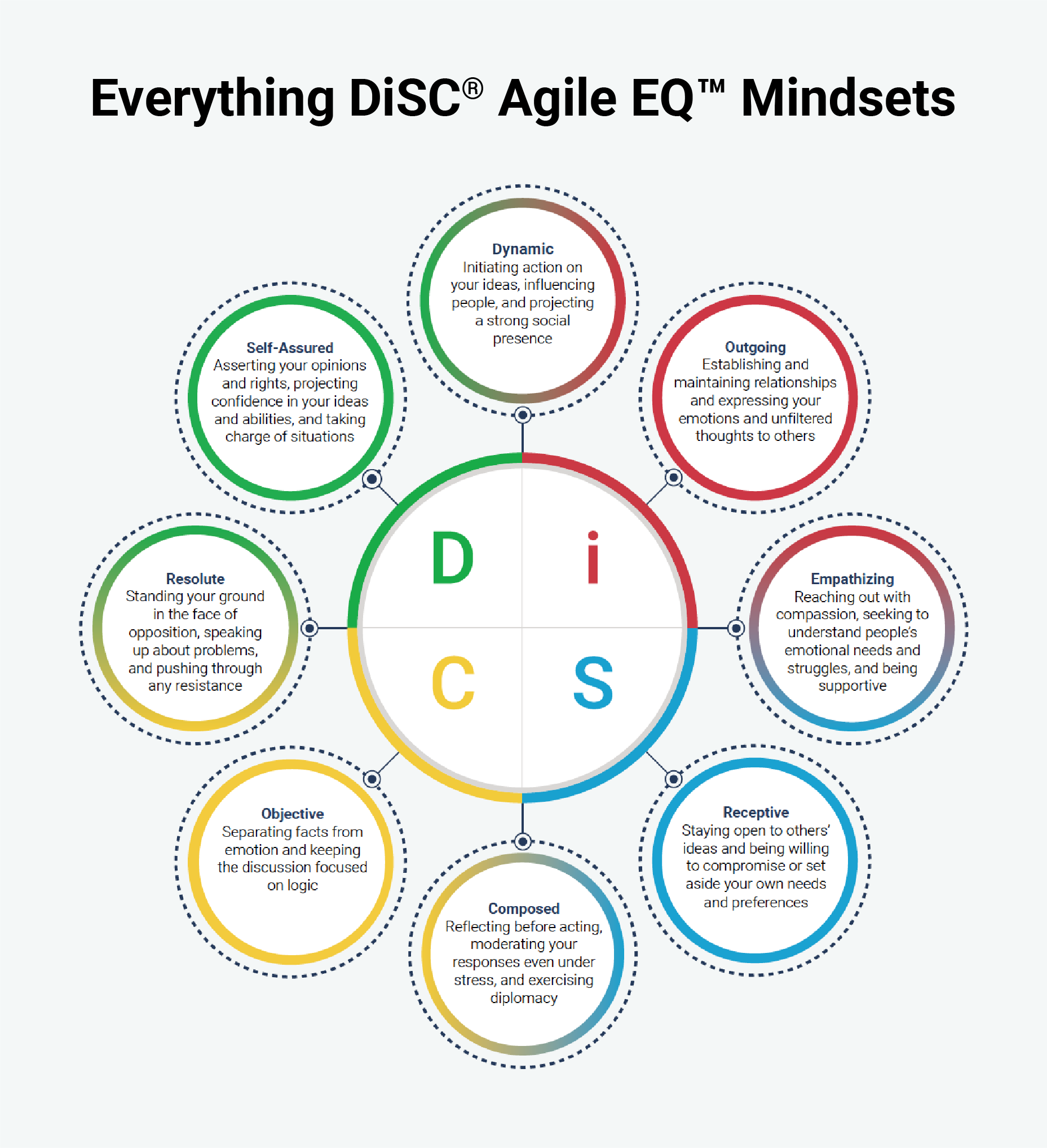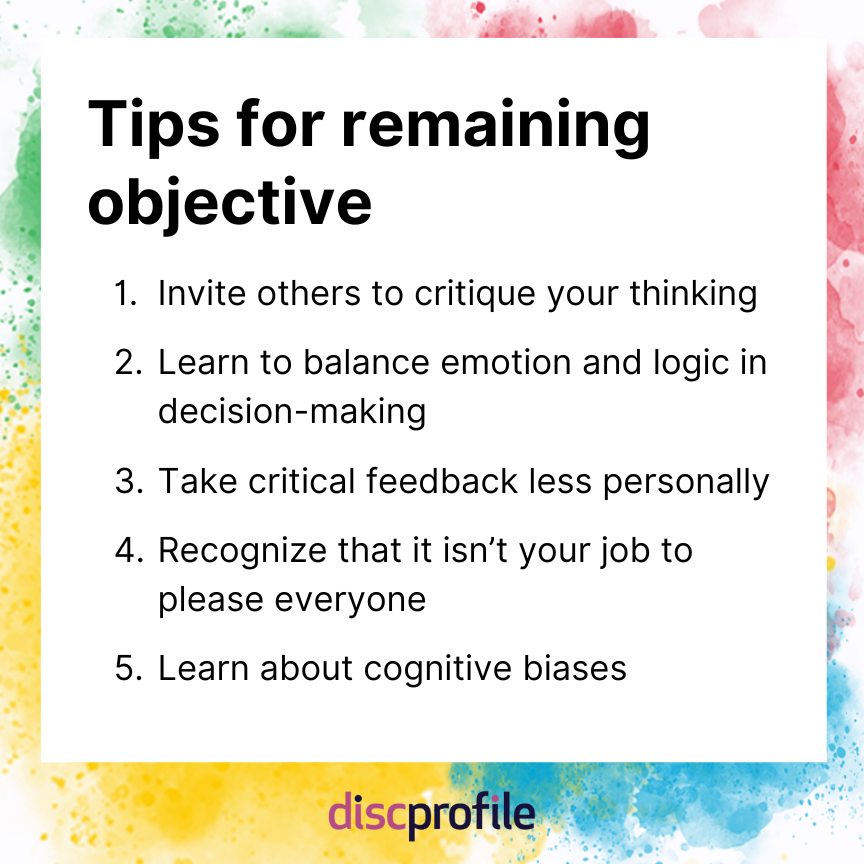How to Be More Objective

Are there times when you wish you were better at separating facts from feelings, understanding your biases, and seeing a problem or situation with more clarity? Although something like objectivity may seem like a trait you either have or you don’t, it’s actually a skill you can develop with practice. In this article, learn what drives naturally objective people and get tips for how to be more objective even when it’s not your first instinct.
Key Takeaways
- People with objective personalities separate facts from emotions and consider all angles.
- People of all personality types may want to be more objective when avoiding rash decisions, discussing sensitive topics, or de-escalating tension.
- Practice being more objective by inviting others to critique your thinking, balancing emotion and logic when making decisions, and learning about different cognitive biases, among other tips.
What does being objective mean?
“I let facts guide my thinking.”
People who are naturally objective consider all angles and construct logical arguments. It’s not about being a robot; it’s about being aware of how emotions and biases impact their viewpoint. Being honest with themselves about that is different from disconnecting from their emotions.
Objective people understand when feelings and egos need to be set aside. They’re great at compartmentalizing and distilling problems to their essence. They often have the ability to step back and analyze a situation to determine what they can control and what they can’t.
An objective personality often aligns with the DiSC® C style. It is one of the eight mindsets described in Everything DiSC® Agile EQ™.
Source: Everything DiSC Agile EQ
Why are some people more objective?
People reach for the mindsets that help them meet their core emotional needs. Someone who is naturally objective may have key motivators such as:
- maintaining stability, desiring predictable outcomes
- avoiding the chaos of strong emotions
- earning the respect and trust of others
- achieving competence, maintaining high standards
- avoiding mistakes
- protecting dignity
Benefits of remaining objective
Someone with the ability to separate facts from emotions is an incredible asset to any team. Even if objectivity is not a mindset that comes naturally to you, employing it when needed can bring clarity to complex decisions. Other benefits of the objective mindset include the ability to:
- strip away the noise and see more clearly
- zero in on essential facts
- use logic to create common ground and a common language accessible to all sides of a debate
- recognize when emotions are impacting your judgment or the judgment of others
- see how personal relationships are keeping people from acting logically
- produce consistent results your team can rely on
- make choices based on the big picture
- explain to colleagues the rationale behind decisions that impact them
- be confident in your judgment
- sniff out bias
There are aspects of remaining objective that are especially relevant to people of various DiSC styles. For example:
- D styles tend to get carried away with their own certainty, discarding facts that don’t support them. If they stretch into an objective mindset, they can better see their own biases as well as critical information they missed, both of which will ultimately help them be more successful.
- It may be difficult for i styles to deprioritize emotions, but an objective mindset can show them that decisions made to accommodate feelings aren’t always the best ones for a team’s long-term goals.
- A logical approach may bring more consistent and predictable outcomes, something S-style people likely appreciate. Remaining objective can also help temper strong emotions, encouraging the harmonious environment S types prefer.

Situations that may call for remaining objective
Different DiSC styles will need to tap into the objective mindset in different scenarios, but there are some general situations that tend to benefit from an objective approach:
- identifying the critical facts in a complicated or confusing situation
- distancing yourself from your own biases
- stepping back from your emotions or the emotions of others
- convincing someone who tends to be objective
- gaining insight into a subject that creates strong emotions
Limitations of the objective mindset
If you’re a strong C style and firmly rooted in the objective mindset, there may be a tiny voice in your head saying, “Why would you ever choose not to be objective?” But part of developing emotional intelligence is being able to identify times when stretching to another mindset is the best choice (maybe even objectively the best choice!). If you get stuck in the objective mindset, you might:
- discount the relevance of emotions in team situations
- overwhelm people with logic and facts, especially when they disagree with you
- fail to recognize when someone’s emotional needs should take first priority
- miss out on opportunities that benefit from an intuitive approach
- become lost when the facts don’t present one clear choice
- fail to rally your colleagues around an idea when facts are not enough to get them excited
- forget to consider the emotional impact of a decision on a coworker
- be unable to throw yourself into an experience or let yourself go

Even if you're naturally objective, there may be times when focusing more on relationships or empathy is best for the situation at hand. Read more about the eight Agile EQ mindsets.
Understand why it’s hard for you to remain objective
Recognize your thoughts
The various DiSC styles may struggle with objectivity for different reasons. A person with an iS style may take criticism harder than the situation warrants, whereas a D-style individual may ignore valid criticism if it doesn’t support their vision.
The 26-page personalized Agile EQ profile (see sample) walks you through your own relationship to each mindset. The profile provides concrete tips for recognizing the automatic thoughts driving your behavior, setting goals in line with your comfort level, and creating an action plan to help you achieve them.
Depending on your DiSC style and comfort level with the objective mindset, you may need to fight off thoughts like:
- If I feel this strongly, it has to be right.
- It’s not worth upsetting people.
- I’m being untrue to myself if I don’t follow my gut.
- I know I’m right, even if I don’t have the data to back it up.
- Let’s not waste time thinking through every angle.
Set goals
Then you’ll identify beginner, intermediate, and advanced goals for gaining comfort in calling on the objective mindset when it is needed. Sample goals may be:
- I recognize when I am overly concerned about protecting people’s feelings.
- I can separate the content of feedback from the tone and style in which it’s delivered.
- When forming opinions, I take the time to research relevant facts.
- I usually know when it’s important to set my personal feelings aside.
- I regularly put effort into overcoming my biases.
5 tips for becoming more objective
If objectivity takes a lot of effort for you, those may sound like unreachable goals. But emotional intelligence really is a skill that you can develop with practice. People of different styles will work toward those goals in their own ways, but in general you can become more objective by: inviting critical feedback, learning to balance emotion and logic, not trying to please everyone, and understanding the impact of bias.
1. Invite others to critique your thinking
We are all susceptible to cognitive biases that affect our worldview and decision-making. Confirmation bias is especially common, where individuals unconsciously favor information that aligns with their pre-existing beliefs.
By inviting others to critique your thinking, you can identify these blind spots. Seeking feedback helps ensure you're not overlooking critical perspectives. People who actively solicit feedback tend to perform better at work. They are better able to correct errors in judgment and increase the accuracy of their decisions.
Inviting critique can take many forms. You can send your thoughts to a colleague with a simple What am I missing?. Or you can enlist a wider group of people to gather alternative viewpoints before making a decision. When you take a moment to challenge your assumptions, you'll be able to move forward with a more complete picture.
2. Learn to balance emotion and logic in decision-making
Another cognitive trap that can stand in the way of objectivity is emotional reasoning—basically, using your emotions rather than facts as evidence. Or more simply, If it feels true, it must be true.
For example, when you feel really excited about an idea, you may subconsciously read your excitement as evidence that this idea the best way forward. It's good to be excited about your work. Feeling excitement can help you be more dynamic and rally your team behind your idea.
While enjoying your excitement, however, take a second to make sure the idea you're excited about is what works best. Learn to differentiate between intuition and emotional reasoning.
Strong emotions often influence our ability to think rationally and critically, whether those emotions are positive or negative. But emotions and objectivity are not opposites.
The most exciting option won't always be the right choice, just as the most logical option won't always be. Humans are complex, and most choices benefit from a balance of emotion and logic.
3. Take critical feedback less personally
Yet another cognitive bias most people experience is negativity bias, where we dwell more on negative than positive information. I recently found my college photography portfolio. In my memory, I had done poorly in this class and had no talent for photography. Looking through the instructor comments, I was shocked to find not only an A grade but a long list of positive comments—and a single piece of negative feedback. Guess which item I remembered years later?
My focus on the critical feedback meant I was not seeing the situation objectively. I was never going to be a professional photographer, but by taking critique personally instead of cultivating a growth mindset, I closed doors that didn't need to be closed.
One key to dealing with critical feedback less personally is to separate the self from the message you're receiving. Being more objective about yourself and your performance means seeing feedback as an opportunity to improve rather than a reflection of your worth. It also means considering both positive and negative feedback.
4. Recognize that it isn’t your job to please everyone
The desire to please others can cloud judgment, leading people to make decisions based on others' expectations rather than on facts or logic. Recognizing that it isn’t your job to please everyone frees you from the pressure of trying to meet conflicting expectations.
Remaining objective requires a certain amount of cognitive effort, especially if objectivity isn't your default setting. Going along with what others want means your brain is deferring responsibility. Cognitive effort goes down. You're not actively seeking alternate viewpoints or even consulting your own intuition.
The need for approval can distort objectivity. This will be a tough task for many i- and S-style people, but try to notice when you're in people-pleasing mode. If you can focus less on approval-seeking and more on the facts of the situation, you're more likely to remain objective.
5. Learn about cognitive biases
Our brains take in so much information all the time, and they have developed shortcuts to manage that volume. These mental mechanisms make it possible for us to function (well, most days) but we're not always aware of how they shape our thinking.
To be more objective, you must work to understand the impact of bias in decision-making and communication, and take steps to address your own biases. Experts have identified more than 200 cognitive biases, and we've touched on a few already (confirmation bias, emotional reasoning, negativity bias). Other cognitive and behavioral biases commonly encountered in workplace decision-making include:
- Anchoring bias: Relying too heavily on the first piece of information (the "anchor") you encounter when making decisions
- Availability bias: Making judgments based on the information that is most readily available to you
- Overconfidence bias: Overestimating the accuracy of your knowledge or abilities
- Attribution bias: Attributing people's actions to their character or personality rather than to external circumstances
- Groupthink: Overvaluing harmony or conformity within a group, leading to irrational or dysfunctional decision-making
- Sunk cost fallacy: Continuing to invest in a decision or project based on the resources already invested (e.g., time, money, effort) rather than on the future benefits
By fostering self-awareness and engaging in practices like perspective-taking and critical reflection, you can reduce the influence of your biases and make more objective decisions.

The mindsets that you reach for instinctively are unlikely to change over time, but what can change is your comfort level with stretching into other attitudes. This stretching can improve how you prepare for situations you know may be challenging for you, or may require an approach different from your usual plan of attack.
Posted 08/05/2020, Last Updated 03/28/2025







